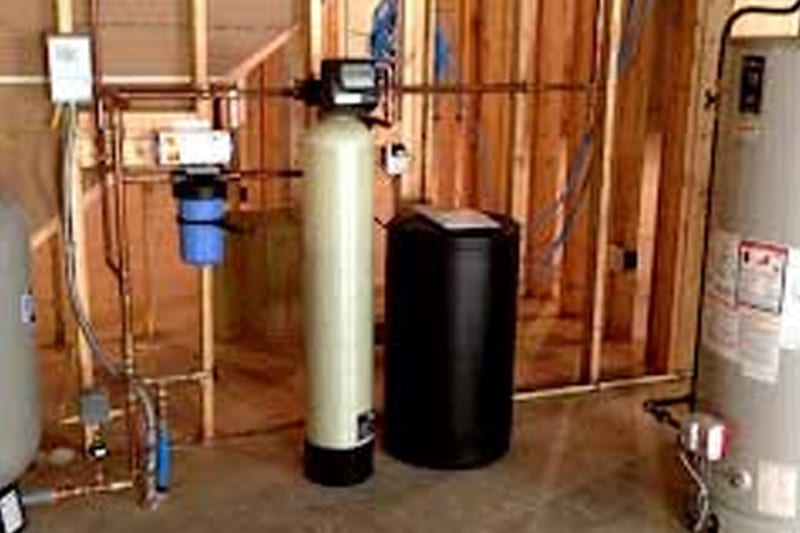Do You Need a Water Softener in your Home?
It’s common for our tap water to contain minerals like magnesium, calcium, and zinc. While these minerals don’t harm us if we drink tap water, we can end up with “hard water” – a term used to describe water that has an overabundance of calcium and magnesium.
If left untreated, these minerals will eventually form chalk and limestone. And, if hard water goes untreated, it can wreak havoc on our homes by clogging pipes and leaving residue on your clothes, body and fixtures, while reducing the efficiency of your appliances and increasing our utility bills.
So, what can you do to eliminate the excess junk in your home’s trunk? We’ll tell you how below. But first, how do you know if you have hard water? Read on.
Checking for Hard Water
Before you invest in a water softener system, you can easily check if your home does have hard water. Look for white scale buildup on your kitchen and bathroom fixtures: faucets, handles, including shower heads. If you have serious hard water buildup, you will see scale encrusted on and around the fixtures. In less serious cases, there may be minimal buildup, but two simple tests will tell you whether the water is hard:
- Fill a container with some water. Add dish soap to the filled container, then shake it up. Are there plenty of suds? If not, hard water is likely the culprit.
Purchase water hardness test strips from a home improvement store. Following the directions, the strip will quickly show you the extent of your home’s water hardness.
If you tried one or both options above and the results show you have hard water, you may want to consider purchasing a water softener.
What is a Water Softener and How Does It Work?
There are two types of water softeners: salt-based and salt-free, and both softeners attach to your home’s water supply.
Salt-based softeners are often used to treat severe hard water cases by adding sodium to the water. The water-hardening minerals (calcium and magnesium) attach to the sodium and are flushed away in the water.
Salt-free softeners, on the other hand, are typically used for less severe cases of hard water. These units treat and remove hard water through magnetic or electrical currents and are considered more environmentally friendly because they don’t require electricity or flush added chemicals through your water.
Soft Water Benefits
Despite the differences between salt-based and salt-free softeners, both systems work well. Here are four benefits of having a water softener in your home.
1. Save money
Hard water, left untreated, won’t just accumulate in your shower or in your hot water heater. When scale builds inside a pipe, it reduces the amount of the space available for the flow of water. This means the water pressure must increase to push water through the pipes. This leads to more heat and energy being used, translating into higher utility bills. A water softener prevents this buildup, which keeps the extra dollars in your pocket, while reducing your carbon footprint.
Using a water softener can also prevent scale building in your dishwasher and laundry machines, which increases the quality, efficiency and lifespan of your clothes washer and dishwasher, as well as your coffee machines, ice makers, and water heaters.
2. Softer hair and skin
After showering in hard water, your hair can hold traces of calcium and magnesium. This makes your hair feel dry and brittle and look dull and frizzy.
Your skin can also feel dry after showering or bathing in hard water as the minerals strip away your skin’s natural oils, leading to itchy and irritated skin. Because soft water contains fewer minerals, your skin picks up and holds moisture easier.
3. Cleaner clothes and dishes
Soft water dissolves soap better than hard water, meaning a deeper clean for your clothes and dishes.
If your home has hard water, minerals are likely left behind on your clothes, which will eventually result in faded colours and dull whites. Because soft water dissolves detergent better, your clothes will be cleaner and brighter.
Your dishes are in for a similar result if washed in hard water, leaving a film on dishes once dried. A water softener fixes the problem by removing the minerals so there is no residue on your dishes. And because soft water fuses with soaps and detergent more completely, there is more lather and more cleaning action in your dishwashing routine.
4. Spend less time cleaning
Anyone who has hard water in their home knows how time-consuming cleaning can be with the scrubbing needed to remove chalky lime and soap scum off showers walls, sinks and faucets. Soft water results in less soap scum and lime buildup, which means less time spent on heavy-duty scrubbing and also reduces the need to use harsh cleaning chemicals to remove the scale.
How Can Sherwood Mechanical Help?
If you are tired of your home’s hard water and scrubbing the mineral deposits off your faucets and shower walls, wearing faded clothes or dealing with your dry, itchy skin, give Sherwood Mechanical a call at 780-449-5322. Our team of professionals can answer your questions about water softeners and set up an install at your convenience.









